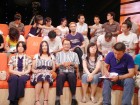On Sunday 14 June, Gilbert was interviewed by Ms. Eyee Hsu, the host of the famous program of CCTV9 “Up-Close”. See here intro and also the list of questions I got. Should be on air in about one month. It is the Chinese version of the “Oprah or Larry King” talk shows.
Up-Close is a program on CCTV International (CCTV9). CCTV International is the English language 24-hour news channel of China Central Television, and is China’s foremost English Channel. Along with its viewers within China, CCTV International covers the whole globe via six satellites. Its programs can be seen by 65 million subscribers in over 120 countries across North America, Europe, Africa, Asia, Oceania, and Central/South America.
Up-Close is an interview program featuring intimate discussions with extraordinary individuals who are making news in China and the world. Broadcast each Sunday, the 45-minute program focuses on exciting newsmakers discussing topics of regional and global concern today. As CCTV9’s only program with a studio audience, our show is an “Up Close” conversation between our inspiring guests and YOU. Touch the times with Up-Close!
Some of former guests:
Ma Yun (Alibaba.com), Juan Antonio Samaranch, He Zhenliang (China’s Olympic Committee), Hein Verbruggen, Fidel V. Ramos, Serge Abou, Jet Li, Geoff Raby, Donald Tsang Yam-kuen, Jane Goodall etc.
- Preparing for the interview
- Gilbert and host Eyee Hsu
- The stage
- Part of the audience (with Valerie)
Questions:
1. The Beijing community nicknames you the “fireman”. Why do they call you that?
2. You became well-known in the Beijing community when you became a senior adviser for the Beijing Municipal Gov’t in 1999 and later became involved in the Beijing Olympics. How did this opportunity come about?
3. What were your responsibilities? People call you the “spokesperson” for Beijing. Or should they call you the Beijing “Salesman”?
4. In the middle of Olympics planning came the SARS epidemic. How did you convince foreign delegates to come to Beijing during that sensitive period?
5. Why do you think you were chosen to play such an important role in the Beijing Olympics?
6. You were a consultant for the large-scale Olympics venues. Today, a big challenge is the revenue potential of the Beijing Olympic venues. What are your thoughts?
7. People say you are probably one of the most influential of the Beijing Municipal government’s foreign experts. Why do you think you have been so successful in this aspect?
8. How has being Belgian played a factor in your success as a “facilitator”?
9. You came to China in 1980. Why did you decide to move here?
10. When you planned on coming to China in 1980, how supportive were your family and friends?
11. What were your first impressions of China back then?
12. Did you enjoy your life here back in the 80s? Did you experience culture shock? What did you do in your free time?
13. How and when did you decide China would become your second home?
14. Compared to the China of the 80s, how would you describe the China of today?
15. I know you have an intelligent and beautiful wife that shares many of your same ideals. She is also Chinese. Did you expect to find your soul mate in China?
16. How “Chinese” have you become?
17. I hear you are one of few foreigners who have a Chinese “green card”. What does this mean to you?
18. You have received a number of awards – from the Chinese government, and your own Belgian Prince bestowed the title of Knight to you! What did this mean to you? What do you remember of that day?
19. The Beijing Olympics are over. What are you focusing your efforts on now?
20. Rumors are there is a book on the way. What is it about?
21. What strikes you the most when you think of your 30 years in China?
22. Do you see yourself ever leaving China?
As for the answers… watch the program…
Overall, nice experience. Working with CCTV people is overall nice – they are very professional – often better than with foreign journalists who can be pretty annoying, abrasive and tricky at times.



